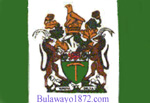|
|
|
|
| The
History of Zimbabwe |
After the decline of Great Zimbabwe, which had begun in
the 13th century, the fragmented Shona tribes allied
themselves and created the Rozwi state and encompassed
over half of present day Zimbabwe. This state
lasted until 1834 when it was invaded by Ndebele warriors and came under the rule of Lobengula. Lobengula soon found himself having to deal with Cecil
Rhodes and the British South Africa Company (BSAC) and
signed a contract giving up mineral rights to his land
in exchange for guns, ammunition and money. A
series of misunderstandings followed this agreement and
the Ndebele found themselves fighting the BSAC.
British Settlement And Administration In 1888, Cecil
Rhodes obtained a concession for mineral rights from
local chiefs. Later that year, the area that became
Southern and Northern Rhodesia was proclaimed a British
sphere of influence. The British South Africa Company
was chartered in 1889, and the settlement of Salisbury
(now Harare, the capital) was established in 1890. |
 |
In
1895, the territory was formally named Rhodesia
after Cecil Rhodes under the British South Africa
Company's administration. In the early 1890's the
losing Ndebele allied themselves with the Shona and continued a guerilla war but eventually an
agreement was reached to end the fighting. |
|
By 1896, it was apparent to the Shona and Ndebele peoples that the Rhodesian government was not interested
in their problems, thus the first Chimurenga (fight
for liberation) was begun. Though this resulted in
moderate success, it ended only a year later when the
leaders were arrested and hanged.
During the next 60
years, conflicts between blacks and whites continued.
Laws were passed guaranteeing rights to whites and
stripping them from blacks. Land was redistributed
to whites and working conditions and wages declined. |
By the late 50's two black political parties, the Zimbabwe
African National Union (ZANU) and the Zimbabwe African
Peoples Union (ZAPU) had sprung up but just as quickly
they were banned and their leaders imprisoned.
In 1964 Ian Smith
became prime minister of Rhodesia, replacing Winston
Field, and started pressing for independence
from Britain. The British imposed strict rules
before they would grant independence and they included
greater equality for blacks. Since Smith knew the
whites would never agree to the conditions, in 1965 he
made a Unilateral Declaration of Independence (UDI).
Sanctions imposed by Britain were ignored by most other
western countries and the economy of Rhodesia actually
improved. Conditions for blacks did not improve
however and a resurgence of ZANU & ZAPU guerilla
warfare began to strike deeper and deeper. Whites
began abandoning their farms. This became known as
the second Chimurenga. |
Smith finally began
to realize that something needed to be done.
Negotiations between Smith and the black political parties
began and broke down. Parties disagreed and
fragmented. Years of negotiations continued as did
white emigration.
In 1976, Ian Douglas Smith received tremendous
international pressure, which he could not ignore, causing
him to reach an agreement with the political leaders which
would result in majority rule in two years. This resulted in the Internal
Settlement of March 3, 1978 and general elections in
April 1979 under a new Constitution, which provided
75 seats for blacks and 25 seats for whites in Parliament.
All residents of Rhodesia over the age of 18, regardless
of race or colour, were enfranchised for this election.
Bishop Muzorewa's UANC Party won a majority of the seats
reserved for blacks and Ian Smith's Rhodesian Front party
won all 25 white reserved seats. The UANC took office in
June 1979, and the country was renamed Zimbabwe Rhodesia.
Although the British Conservative Party,
while it was still the official opposition, had
said they would recognize a majority government
resulting from the Internal Settlement, they reneged on
this promise when they came to power. Instead, they demanded further
negotiations, involving all internal and external
political parties. The Lancaster House Conference took
place in late 1979, at which the British Government, the
UANC and the Patriotic Front (ZANU and ZAPU) agreed to
participate in new elections, which commenced on
27 February 1980.
|
 |
Elections took place over three days, from 27 February to 1 March
1980, under the supervision of the British
Governor. ZANU Patriotic Front won a majority of
seats and Robert Mugabe became Prime Minister. In
1990 ZANU Patriotic Front amended the Lancaster
House Constitution and Mugabe was appointed
President. Country was renamed from Rhodesia to
Zimbabwe. Optimism reigned for a while but tensions soon arose. |
|
Corruption and scandal threatened the government and
rivalries and assassination attempts on government
officials occurred on a regular basis. By 1996
Mugabe led government was said to be embroiled in scandals
and in an
attempt to retain power it unveiled the land reform
program.
Land reform in
Zimbabwe had long between a topic of discussion as the
minority white population owned the vast majority of farm
land. The Lancaster House Agreement had stipulated
that land transfers would take place with adequate
compensation, but as Zimbabwe became deeper involved in
helping Congo (Zaire) with their war, less money was
available for compensation. In 1998 the government
began seizing white owned farms and compensating owners
only for improvements made to the land, such as houses,
but not for the land itself. Land owners refused to
move and this has resulted in some cases of violence where
the homeowners were forcibly removed and murders have occurred
to intimidate other landowners.
|
|
| Submit your version here |
| If you feel this is not an accurate account and you have a
more accurate one, or you have a clarification , you can submit
your version of the account here |
|
|
|
|
|
|
|
| |
|